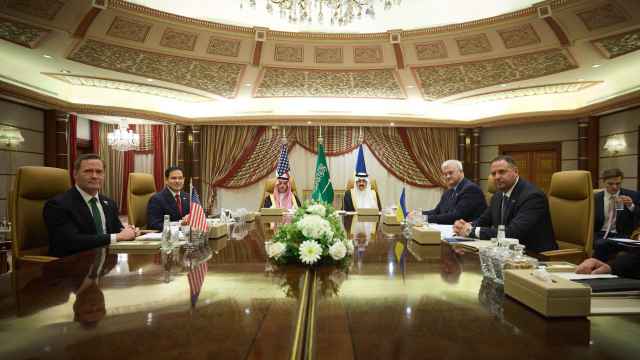New labels displaying energy efficiency information will start appearing on appliances and building materials sold in Russia by the end of the year, experts said at a news conference organized by the Association of European Businesses, on AEB, on Wednesday.
It is a joint project between the European Bank for Reconstruction and Development, or EBRD, and AEB, aimed at promoting awareness of and stimulating investments in energy efficient equipment in Russia.
The project has the potential to have a positive impact on the environment and the the country's economy, said Frank Schauff, AEB's chief executive.
Using less energy means using less fossil fuels, which leads to less CO2 emissions and helps to slow down climate change, Schauff said.
The Russian market needs an easy-to-understand label that would help consumers choose energy efficient products, said Olga Tulikova from the Russian Energy Agency, which was established in 2009 by the Energy Ministry to implement measures to reduce the economy's energy intensity.
With regard to economic benefit, using energy efficient devices, machinery and home appliances will result in financial savings, freeing funds that could be reused for other purposes, he added.
"At the EBRD, we invest from 2 to 3 billion euros ($2.7 billion to 4 billion) a year in 70 to 80 projects. And every project always has some energy efficiency components," said Lindsay Forbes, the EBRD's director for industry, commerce and agribusiness in Russia.
"You might think that a label is rather a small thing,when there is so much need, so much opportunity for energy saving," he said. "We think that labeling in a certain way gets to the people. It creates awareness one business, one consumer at a time."
Werner Peylo, director of the Russian Sustainable Energy Financial Facility, or RuSEFF, explained the mechanism that would be used to stimulate the use of energy-efficient products and to promote awareness of the new label.
The EBRD has made available 300 million euros to Russian financial institutions specializing in funding the country's entrepreneurs.
To access the funds, applicants have to demonstrate that their projects can develop energy-saving products and have at least 10 percent return on investment. The EBRD contracted a German consulting firm to assist financial institutions with project appraisals, Peylo said.
On top of that, the RuSEFF will maintain an information portal with a list of tested and certified energy-efficient materials and equipment separated into about 30 different categories, for example: trucks, busses, heating systems, windows, bulldozers, and boilers.
Customers can access the list when selecting building materials, Peylo said.
Every item listed in this database can be automatically financed by the RuSEFF, which will serve as a motivation for manufacturers to have their products tested and added to the list, he added.
In its initial stage the labeling scheme will be tested on only three product categories: electrical motors, windows and refrigerators.
The actual design of the label is expected to be revealed in a few months, after it is registered with the Russian technical regulation and metrology agency Rosstandard, said Fyodor Plaskovitsky, AEB's labeling scheme marketing manager.
Contact the author at g.moukine@imedia.ru
A Message from The Moscow Times:
Dear readers,
We are facing unprecedented challenges. Russia's Prosecutor General's Office has designated The Moscow Times as an "undesirable" organization, criminalizing our work and putting our staff at risk of prosecution. This follows our earlier unjust labeling as a "foreign agent."
These actions are direct attempts to silence independent journalism in Russia. The authorities claim our work "discredits the decisions of the Russian leadership." We see things differently: we strive to provide accurate, unbiased reporting on Russia.
We, the journalists of The Moscow Times, refuse to be silenced. But to continue our work, we need your help.
Your support, no matter how small, makes a world of difference. If you can, please support us monthly starting from just $2. It's quick to set up, and every contribution makes a significant impact.
By supporting The Moscow Times, you're defending open, independent journalism in the face of repression. Thank you for standing with us.
Remind me later.





